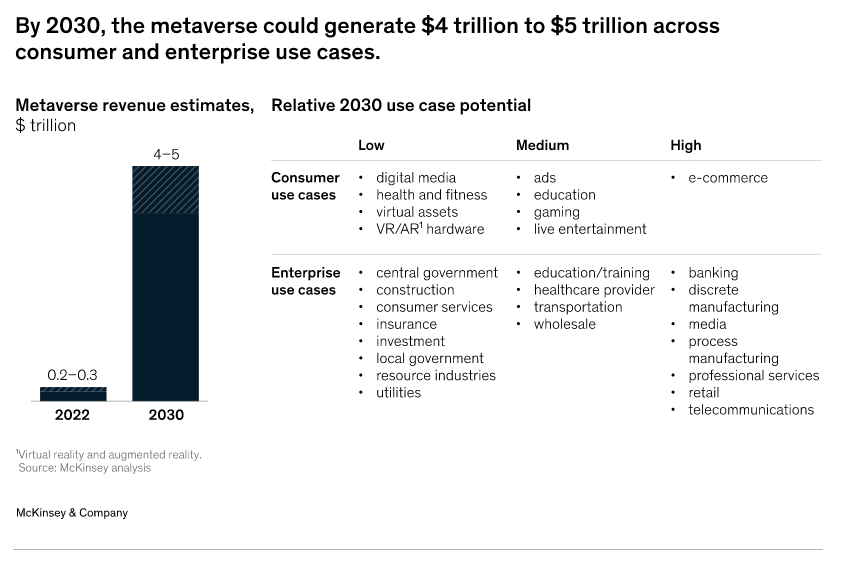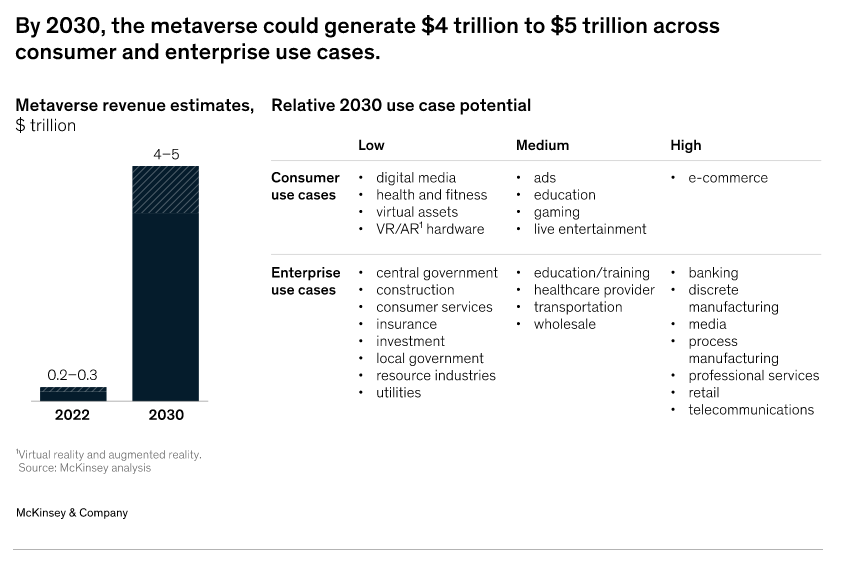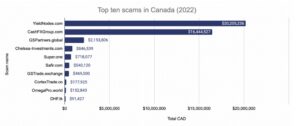McKinsey & Co | Homayoun Hatami, Eric Hazan, Hamza Khan, and Kim Rants | Jan 24, 2023
 When we estimated the market value of metaverse activity in June 2022, we calculated that it was between $200 billion and $300 billion. It’s larger now, and in eight years or so, it could be $4 trillion to $5 trillion
When we estimated the market value of metaverse activity in June 2022, we calculated that it was between $200 billion and $300 billion. It’s larger now, and in eight years or so, it could be $4 trillion to $5 trillion
- Exponential growth is possible because of an alignment of several forces: the metaverse’s appeal spans genders, geographies, and generations; consumers have already shown they are ready to spend on metaverse assets; they are open to adopting new technologies; companies are investing heavily in the required infrastructure; and brands experimenting in the metaverse are finding that customers are delighted.
See: Building Comprehensive Digital Identities in the Metaverse
- Two leading use cases: Soon, companies will likely offer customers an unprecedented shopping experience in the metaverse; effectively, it will be a 3-D e-commerce channel. For now, to get a sense of the potential, consider two of the largest and more advanced uses, one for consumer businesses and one for B2B companies:
- Brand marketing and consumer engagement. Many companies have already added the metaverse to their omnichannel marketing mix, staking out a presence in virtual worlds like Roblox, Fortnite, and the Sandbox. Some are already finding success.
- Nike has hosted more than 26 million visitors at Nikeland, its space in Roblox, and it has sold over $185 million of NFTs for digital sneakers and suchlike products.And its digital division has tripled revenues to exceed $10 billion, almost a quarter of the company’s total.
- Digital twins. In the metaverse, every asset, process, or person within and related to an enterprise can be replicated virtually—and connected. As a result, nearly every aspect of work can take place digitally before it does so physically. By building digital twins—virtual replicas of physical settings and objects in a metaverse that generate data in real time—far richer analyses can be generated to enable improved decision making.
- Brand marketing and consumer engagement. Many companies have already added the metaverse to their omnichannel marketing mix, staking out a presence in virtual worlds like Roblox, Fortnite, and the Sandbox. Some are already finding success.
See: Highlights from McKinsey’s “Value Creation In The Metaverse” Report + Web3 for Skeptics by Brainsy’s CIO
- CEOs can act/plan/benefit now: Both the optimists and the skeptics have solid evidence to support their views. But the balance of evidence may slightly favor the optimists. Seventy-one percent of the 79 largest consumer firms globally have already put down stakes in the metaverse. The rest are running the risk of being caught without a plan. Companies in other industries are watching carefully and making plans; very few will be untouched by the metaverse.
- Depends on the sector: the metaverse has the most potential to upend sectors such as banking, manufacturing, media, professional services, retail, and telecommunications. CEOs in these industries could consider taking more assertive steps than others.
Continue to the full article –> here
 The National Crowdfunding & Fintech Association (NCFA Canada) is a financial innovation ecosystem that provides education, market intelligence, industry stewardship, networking and funding opportunities and services to thousands of community members and works closely with industry, government, partners and affiliates to create a vibrant and innovative fintech and funding industry in Canada. Decentralized and distributed, NCFA is engaged with global stakeholders and helps incubate projects and investment in fintech, alternative finance, crowdfunding, peer-to-peer finance, payments, digital assets and tokens, blockchain, cryptocurrency, regtech, and insurtech sectors. Join Canada’s Fintech & Funding Community today FREE! Or become a contributing member and get perks. For more information, please visit: www.ncfacanada.org
The National Crowdfunding & Fintech Association (NCFA Canada) is a financial innovation ecosystem that provides education, market intelligence, industry stewardship, networking and funding opportunities and services to thousands of community members and works closely with industry, government, partners and affiliates to create a vibrant and innovative fintech and funding industry in Canada. Decentralized and distributed, NCFA is engaged with global stakeholders and helps incubate projects and investment in fintech, alternative finance, crowdfunding, peer-to-peer finance, payments, digital assets and tokens, blockchain, cryptocurrency, regtech, and insurtech sectors. Join Canada’s Fintech & Funding Community today FREE! Or become a contributing member and get perks. For more information, please visit: www.ncfacanada.org
Related Posts
- SEO Powered Content & PR Distribution. Get Amplified Today.
- Platoblockchain. Web3 Metaverse Intelligence. Knowledge Amplified. Access Here.
- Source: https://ncfacanada.org/what-ceos-should-know-about-the-metaverse/
- 2018
- 2022
- a
- About
- activity
- added
- Adopting
- advanced
- affiliates
- already
- alternative
- and
- appeal
- article
- aspect
- asset
- Assets
- B2B
- Balance
- Banking
- because
- become
- before
- being
- between
- Billion
- blockchain
- brands
- Building
- businesses
- cache
- calculated
- Canada
- carefully
- cases
- caught
- CEOs
- Channel
- CIO
- closely
- community
- Companies
- Company’s
- comprehensive
- connected
- Consider
- consumer
- Consumer Engagement
- Consumers
- could
- create
- creation
- Crowdfunding
- cryptocurrency
- Customers
- data
- decentralized
- decision
- Decision Making
- delighted
- digital
- Digital Assets
- digitally
- distributed
- Division
- down
- e-commerce
- ecosystem
- Education
- effectively
- enable
- engaged
- engagement
- Enterprise
- estimated
- Ether (ETH)
- Every
- evidence
- exceed
- experience
- favor
- few
- finance
- financial
- finding
- fintech
- firms
- Forces
- Fortnite
- from
- full
- funding
- generated
- generations
- geographies
- get
- Global
- Globally
- Government
- Growth
- heavily
- helps
- highlights
- hosted
- HTTPS
- identities
- improved
- in
- In other
- industries
- industry
- information
- Infrastructure
- Innovation
- innovative
- Insurtech
- Intelligence
- investing
- investment
- IT
- Jan
- Know
- larger
- largest
- leading
- likely
- Making
- manufacturing
- Market
- Marketing
- max-width
- McKinsey
- Media
- member
- Members
- Metaverse
- million
- more
- most
- nearly
- networking
- New
- New technologies
- objects
- offer
- omnichannel
- ONE
- open
- opportunities
- Other
- Others
- partners
- payments
- peer to peer
- percent
- perks
- person
- physical
- Physically
- Place
- plan
- plans
- plato
- Plato Data Intelligence
- PlatoData
- please
- potential
- presence
- process
- Products
- professional
- projects
- provides
- put
- Quarter
- ready
- real
- Regtech
- related
- replicated
- report
- required
- REST
- result
- retail
- revenues
- Risk
- Roblox
- running
- sandbox
- sector
- Sectors
- sense
- Services
- settings
- several
- Shopping
- should
- shown
- Skeptics
- Sneakers
- So
- solid
- some
- Soon
- Space
- spans
- spend
- stakeholders
- Staking
- Steps
- Stewardship
- success
- such
- support
- Take
- taking
- Technologies
- telecommunications
- The
- The Metaverse
- The Sandbox
- their
- thousands
- to
- today
- Tokens
- Trillion
- Twins
- unprecedented
- use
- value
- vibrant
- views
- Virtual
- virtual worlds
- watching
- Web3
- What
- will
- within
- without
- Work
- works
- world’s
- years
- zephyrnet













